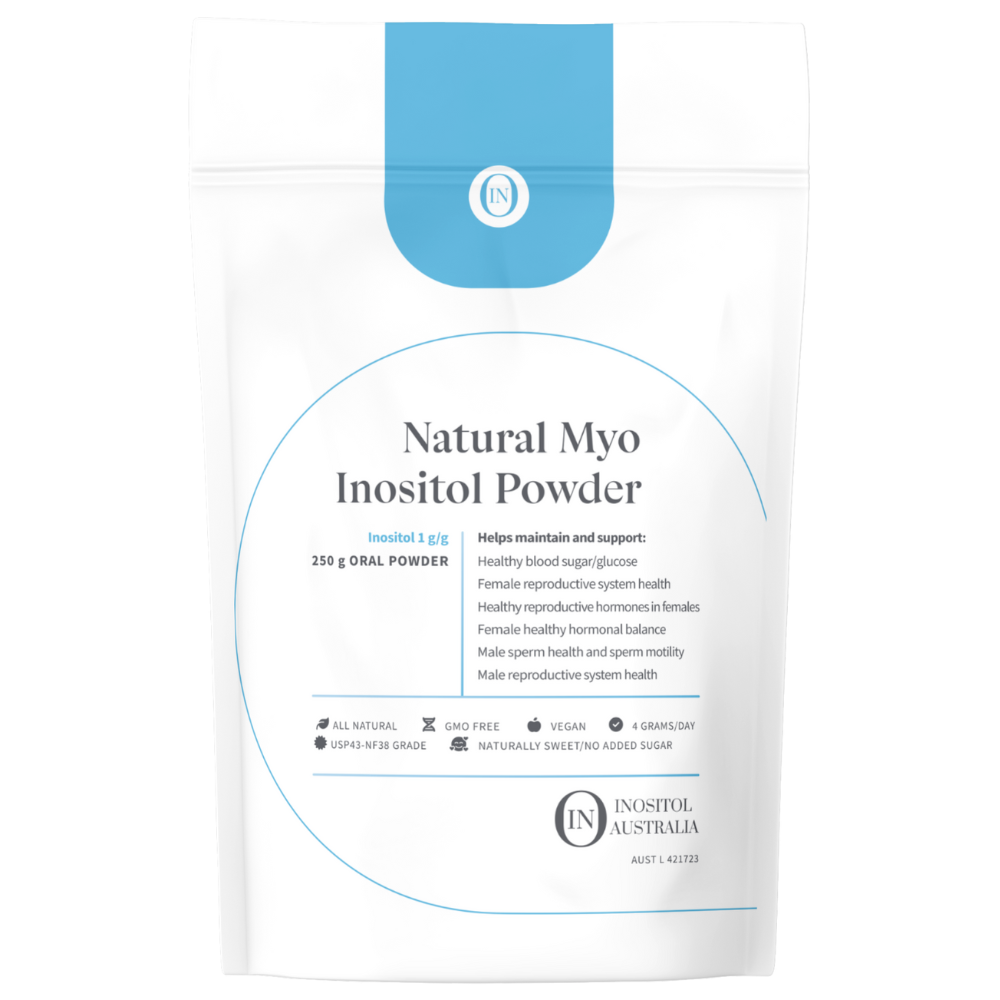
Treating PCOS naturally is possible. If you have been recently diagnosed with PCOS (or polycystic ovarian syndrome) or you’ve had PCOS and you are looking for alternative therapies, then you might have stumbled across Inositol. What is Inositol for PCOS ? A vitamin-like substance, Inositol has shown to be a powerful method for treating PCOS symptoms and for improving fertility changes generally in individuals and specifically in those with PCOS.
Considering that PCOS can contribute to health conditions like high cholesterol and type 2 diabetes, it is important to treat your symptoms sooner rather than later. Inositol is one of the most widely recommended supplements for controlling PCOS symptoms, especially since it is a natural supplement and not a pharmaceutical. If you’re not sure about your PCOS symptoms, consider taking this self-assessment. This self-assessment can help you to determine if you have the condition, the severity of your condition, and the steps you’ll need to consider to treat it.
If you’re uncertain about treating your PCOS symptoms with Inositol, especially before stopping any medication, know that Inositol is naturally produced in our bodies, and supplementing with it rarely produces side effects of its own.
What is Inositol?
A powerful, vitamin-like substance that is produced naturally in the body and also consumed in many common foods that we eat, Inositol is actually a sugar that can influence insulin action, androgen function, fertility, and other hormonal functions. Inositol is largely taken for two purposes, to treat symptoms of PCOS and infertility, but it is also useful for improving cognitive health and issues related to insulin resistance.
Inositol can be consumed naturally, as mentioned, but it can also be supplemented. For supplemental purposes, the dosage ranges from larger (around 16 grams daily) to lower doses (2 grams daily).
Understanding PCOS
It is unknown what causes PCOS, but likely PCOS shows up due to genetics (especially if a relative has PCOS), weight gain, and insulin resistance properties. Referred to as polycystic ovarian syndrome, PCOS is a hormonal disorder that affects around 5% of women of reproductive age. Sometimes the symptoms of PCOS are unnoticeable. Many times, women find out that they have the syndrome when they are trying to get pregnant.
In general, PCOS causes some physiological changes. PCOS affects the ovarian and menstrual cycle in that it disrupts the body’s ability to convert androgens. Therefore, women with PCOS have an excess amount of androgens, which tells the ovarian and menstrual cycles that they need not continue as normal.
PCOS individuals also have polycystic ovaries. Little sacs might show up on the ovaries, but surprisingly these aren’t actually cysts. Instead, they are fluid-filled sacs or enlarged follicles. Unfortunately, these sacs can build up over the ovaries and lead to higher risks of ovarian malfunction, halted ovulation, and cancer. Other symptoms of PCOS come from excess androgens, including thicker, coarser hair in areas that don’t normally have a lot of hair (otherwise known as hirsutism) and acne.
Symptoms of PCOS include:
- No periods, irregular periods, or periods that have a few months in between
- Issues getting pregnant (this is due to long and irregular ovulation cycles)
- Excess (and usually coarse) hair in certain places, like on the face, back, chest, or buttocks
- Weight gain
- Thinning hair
- Oily skin
PCOS individuals commonly report weight gain as a symptom, which can affect fertility and insulin properties. This is because PCOS individuals will have lower levels of Inositol, with less of an ability to control insulin. Therefore, the body is unable to regulate the natural production of insulin and disrupts weight and metabolism function.
Taking Inositol can help individuals to lower their weight (slightly) but also to regulate basic functions associated with metabolism. In doing so, individuals can improve their overall metabolic health and reduce high blood pressure, high cholesterol, and other issues related to weight gain.
Inositol and its Effects
Inositol is a major component in cell membranes in your body and is produced in the kidneys. This hormone is released into the bloodstream regularly, and especially after consuming carbohydrates. Therefore, it plays a major role in physiological structure and function. Some of the ways that Inositol influences the body physiologically include:
- Regulating the action of insulin for insulin resistance properties
- Regulating blood sugar control
- Increasing insulin’s binding properties, acting as a “secondary messenger” for insulin signalling
- Allowing cells to take in sugar (or glucose) for energy production
- Interacting with chemical messengers in the brain, like dopamine and serotonin
- Supporting the body’s normal mechanisms and processes
- Promoting normal hormone levels
- Promoting healthy ovulation cycles
- Improving mood
While not considered to be an “essential vitamin,” largely because we get enough of it already, Inositol is clearly a part of many physiological processes. Inositol is also known as vitamin B8 and it has many offshoots. The two most commonly referred to Inositol structures are Myo-Inositol and D-chiro-Inositol, which both can have a positive effect on metabolic health.
Each Inositol type might interact with the body differently. For example, D-chiro-inositol targets insulin-resistant properties of non-ovarian tissues, whereas Myo-Inositol targets insulin-resistant properties of ovarian tissues directly. This is why you should be taking Myo-Inositol specifically for fertility-related issues and for PCOS regulation. Myo-Inositol is better for you and you should not be taking too much D-chiro-inositol. It can also strongly influence insulin resistance properties because it is influencing insulin through ovarian tissues.
Studies support this, of course. A systematic review identified that Myo-Inositol had significant impacts on hormonal parameters of PCOS individuals. The systematic review highlighted the following impacts:
- Improved glucose to insulin ratios
- PCOS individuals showed fewer symptoms
- Less risk of developing insulin-related issues
Additional findings suggest that Myo-Inositol taken at 4 grams per day for at least six months can reduce some of the other side effects associated with PCOS, such as hirsutism.
Inositol for PCOS
If you’re looking to take Inositol for PCOS then you have likely been diagnosed with the condition. Of course, if you have not been diagnosed with this condition, you still may be wondering if you have PCOS. If you’re unsure and don’t believe that the symptoms are serious enough, you can consider taking Inositol to see if the symptoms improve. If they do improve, then seek medical attention from your doctor so that you can be prescribed medication that will adequately help your situation.
In using Inositol to treat PCOS, consider your symptoms, additional factors like other underlying health issues, whether Inositol is needed to treat something else in addition to PCOS (like fertility) and your daily lifestyle. You’ll need to consider all of these factors in order to find the right dose.
Taking Inositol should always be supplemented by lifestyle factors, like a healthy diet and physical activity, and you should consider speaking to your doctor about the specific effects of Inositol. If you are trying to get pregnant and you also have PCOS, then you should refer to our guide about taking Inositol with PCOS and for fertility. You’ll want to be mindful in this case of taking something other than pure Myo-Inositol.
Finding the right dose for you means some trial and error, so be patient with the results. Know that taking Inositol is completely safe, so long as you go with a trusted supplement provider. Consider Inositol Australia Inositol powder, so you know that you are getting exactly what you need and in a big enough dose.
-
Sale!
Natural Myo Inositol for PCOS / Hormonal Balance
$ 34.95 – $ 179.95 Select options This product has multiple variants. The options may be chosen on the product page -
PCOS Starter Bundle
$ 69.95 Add to cart -
Morlife Collagen Protein Water – 400g – Tropical or Berry
$ 54.95 Select options This product has multiple variants. The options may be chosen on the product page
References
Alessandro D Genazzani. (2016). Inositol as putative integrative treatment for PCOS. Reprod Biomed Online 33(6):770-780. doi: 10.1016/j.rbmo.2016.08.024.Retrieved Jan 14, 2021.
Inositol Australia. (2020). 7 PCOS Symptoms Every Women Should Check. Retrieved Jan 14, 2021.
Inositol Australia. (2021). PCOS Inositol Powder | Pure & Natural. Retrieved Jan 14, 2021.
Martino Maria Zacchè 1, Luigi Caputo, Susanna Filippis, Gabrio Zacchè, Moreno Dindelli, Augusto Ferrari. (2009). Efficacy of myo-inositol in the treatment of cutaneous disorders in young women with polycystic ovary syndrome. Gynecol Endocrinol 25(8):508-13. doi: 10.1080/09513590903015544. Retrieved Jan 14, 2021.
Mayo Clinic. (2021). Polycystic ovary syndrome (PCOS) – Symptoms and causes. Retrieved Jan 14, 2021.
V Unfer 1, G Carlomagno, G Dante, F Facchinetti. (2012). Effects of myo-inositol in women with PCOS: a systematic review of randomized controlled trials. Gynecol Endocrinol 28(7):509-15. doi: 10.3109/09513590.2011.650660. Retrieved Jan 14, 2021.





